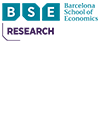Researchers in the Barcelona GSE community have written several widely-read articles on CEPR’s policy portal, VoxEU and have also contributed work to the Horizon 2020 European Project, “A Dynamic Economic and Monetary Union” (ADEMU), of which the Barcelona Graduate School of Economics has been a partner institution.
Here is a selection of research from VoxEU and ADEMU by Barcelona GSE Affiliated Professors from recent months. Articles are listed in chronological order.
On the direct and indirect real effects of credit supply shocks
Laura Alfaro, Manuel García Santana, Enrique Moral-Benito
Propagation through buyer-seller interactions may amplify the aggregate impact of bank lending shocks on real activity. This column presents insights from estimating the direct and indirect effects of exogenous credit supply shocks in Spain between 2002 and 2013. Both direct and indirect effects of bank credit shocks had sizable effects on investment and output throughout the period. Trade credit extended by suppliers and price adjustments both appear to explain downstream propagation of financial shocks.
How firms shape export performance
Alessandra Bonfiglioli, Rosario Crinò, Gino Gancia
To date there has been little systematic evidence on the role of firms in explaining country performance. This column explores how the products of firms from all over the globe fare in competition in the US market. Results show that the countries that capture larger market shares have more exporters, producing higher-quality products, with a more dispersed distribution of firm attributes. Larger and richer markets are characterised by a more dispersed distribution of sales and quality, and a higher incidence of superstar firms.
Imperfect substitution and development accounting
Francesco Caselli, Antonio Ciccone
Contributions to the development accounting literature suggest that human capital plays only a modest role in explaining the large income gaps across the world. This column reviews some of these studies to assess the impact of the relative efficiency and relative supply of high- versus low-skilled workers in labour markets. It concludes that differences in skill premia across countries are not due to differences in human capital embodied in skilled workers, but rather to differences in country-specific technological and institutional environments.
On the interaction between fiscal consolidation and migration in Europe – ADEMU Perspectives
Jordi Caballé
Worsening labour market conditions and fiscal tightness in the aftermath of the recent financial crisis have led to increased migration outflows from peripheral countries of the euro area. The surge in unemployment rates and the lack of work opportunities, together with fiscal austerity involving tax hikes, cuts in social benefits, and restrictions in new recruitment of public employees, have contributed to this notable increase in migration flows. This ADEMU Perspectives examines the effects of migration on unemployment and austerity.
The EMU after the euro crisis: Insights from a new eBook – Findings and proposals from the Horizon 2020 ADEMU project
Ramon Marimon, Thomas Cooley
The Horizon 2020 ADEMU project has aimed to reassess the fiscal and monetary framework of the Economic and Monetary Union in the wake of the euro crisis. This column introduces a new VoxEU ebook which presents the main findings from the project, including the lessons we can extract from the crisis and the policy response. It also outlines the two main proposals arising from the project relating to the European Stability Fund and a European Unemployment Insurance System.

